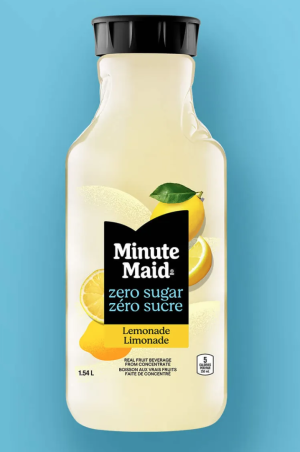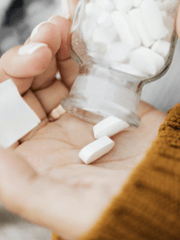Shocking Discovery Sparks Massive “Zero Sugar” Soda Recall – Find Out Why!
By
Aubrey Razon
- Replies 0
In a revelation that's causing ripples across the beverage industry, Coca-Cola has been forced to recall thousands of cases of one of its most popular zero-sugar drinks.
The reason? An investigation uncovered that these supposedly sugar-free drinks were anything but. Check if your purchase is affected!
A mislabeling mishap led to regular lemonade, which contains a significant amount of sugar, being packaged as the zero-sugar variant.
This error is more than just a simple oversight; it's a serious health concern.
For individuals managing conditions such as diabetes, the unexpected intake of 40 grams of sugar per 12-ounce can could have severe consequences.
The recall, which began on September 10, 2024, specifically targets 13,152 cases of the beverage that were distributed to stores in Indiana, Kentucky, and Ohio.
The U.S. Food and Drug Administration (FDA) has categorized this recall as Class II. This classification is reserved for situations where there's a slight chance that using the product could lead to adverse health outcomes.
It's a step below the most severe recall level, but it's enough to prompt swift action from both the company and consumers.
The specific products in question can be identified by the codes FEB1725CNA or FEB1725CNB, with the UPC code 0 25000 12115 9.
Coca-Cola has taken measures to ensure that the affected lemonade is no longer available for purchase and has issued guidance for customers to either dispose of the product or return it to the place of purchase for a full refund.
This incident is part of a larger, worrying trend in the food and beverage industry.
According to Trace One, a regulatory compliance company, food recalls have surged by 20% from 2020 to 2023.
Allergen contamination takes the lead as the most common cause, responsible for 40% of recalls.
Mislabeling, while less frequent, still accounts for a significant portion of the total, coming in as the fourth most common reason for recalls.
In light of this recall, here are some steps you can take to protect yourself and your loved ones:
1. Check Your Pantry: If you have purchased Minute Maid Zero Sugar Lemonade recently, verify the codes on the packaging against those mentioned in the recall.
2. Understand the Labels: Learn how to read and understand food labels, including nutritional content and ingredient lists, to ensure you're consuming what you intend to.
3. Stay Informed: Sign up for FDA recall alerts or subscribe to our daily newsletter to stay up-to-date on the latest food safety information.
4. Spread Awareness: Share this information with friends and family, especially those who may be affected by dietary restrictions.
5. Contact Manufacturers: If you're ever in doubt about a product, don't hesitate to reach out to the manufacturer for clarification.
 Have you ever been affected by a food recall? How do you ensure the products you buy meet your dietary needs? Share your thoughts and experiences in the comments below.
Have you ever been affected by a food recall? How do you ensure the products you buy meet your dietary needs? Share your thoughts and experiences in the comments below.
The reason? An investigation uncovered that these supposedly sugar-free drinks were anything but. Check if your purchase is affected!
A mislabeling mishap led to regular lemonade, which contains a significant amount of sugar, being packaged as the zero-sugar variant.
This error is more than just a simple oversight; it's a serious health concern.
For individuals managing conditions such as diabetes, the unexpected intake of 40 grams of sugar per 12-ounce can could have severe consequences.
The recall, which began on September 10, 2024, specifically targets 13,152 cases of the beverage that were distributed to stores in Indiana, Kentucky, and Ohio.
The U.S. Food and Drug Administration (FDA) has categorized this recall as Class II. This classification is reserved for situations where there's a slight chance that using the product could lead to adverse health outcomes.
It's a step below the most severe recall level, but it's enough to prompt swift action from both the company and consumers.
The specific products in question can be identified by the codes FEB1725CNA or FEB1725CNB, with the UPC code 0 25000 12115 9.
Coca-Cola has taken measures to ensure that the affected lemonade is no longer available for purchase and has issued guidance for customers to either dispose of the product or return it to the place of purchase for a full refund.
This incident is part of a larger, worrying trend in the food and beverage industry.
According to Trace One, a regulatory compliance company, food recalls have surged by 20% from 2020 to 2023.
Allergen contamination takes the lead as the most common cause, responsible for 40% of recalls.
Mislabeling, while less frequent, still accounts for a significant portion of the total, coming in as the fourth most common reason for recalls.
In light of this recall, here are some steps you can take to protect yourself and your loved ones:
1. Check Your Pantry: If you have purchased Minute Maid Zero Sugar Lemonade recently, verify the codes on the packaging against those mentioned in the recall.
2. Understand the Labels: Learn how to read and understand food labels, including nutritional content and ingredient lists, to ensure you're consuming what you intend to.
3. Stay Informed: Sign up for FDA recall alerts or subscribe to our daily newsletter to stay up-to-date on the latest food safety information.
4. Spread Awareness: Share this information with friends and family, especially those who may be affected by dietary restrictions.
5. Contact Manufacturers: If you're ever in doubt about a product, don't hesitate to reach out to the manufacturer for clarification.
Key Takeaways
- Coca-Cola has recalled thousands of cases of Minute Maid Zero Sugar Lemonade due to mislabelling which resulted in regular lemonade containing sugar being packaged as zero sugar.
- The recall poses a health risk for individuals with diabetes and others who need to avoid sugar intake, as the mislabelled drinks contain 40 grams of sugar per 12-ounce can.
- The recall specifically affects products shipped to retail stores in Indiana, Kentucky, and Ohio, with specific codes for identification provided to consumers.
- Mislabelling and food recalls are on the rise, with allergen contamination and mislabelling constituting significant reasons for the recent increase in food recalls.








